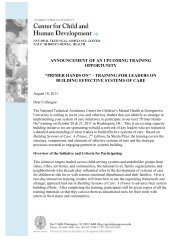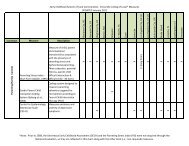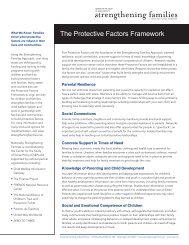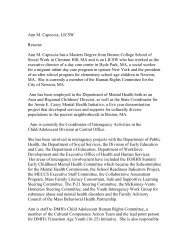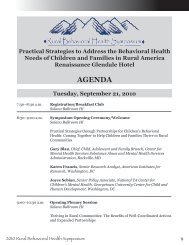Training Institutes 2012 - National Technical Assistance Center for ...
Training Institutes 2012 - National Technical Assistance Center for ...
Training Institutes 2012 - National Technical Assistance Center for ...
Create successful ePaper yourself
Turn your PDF publications into a flip-book with our unique Google optimized e-Paper software.
Dramatizations will be presented to demonstrate the elements of the model. In addition, participants will create a draft<br />
blueprint to take back to their states and communities with next steps <strong>for</strong> creating behavioral health-education<br />
partnerships and implementing PBIS and wraparound in schools. The faculty team will include the perspectives of a<br />
state administrator, a family member, an education representative, and a wraparound consultant and trainer. A resource<br />
person will add the perspective of an early childhood coordinator.<br />
MODERATOR/PRESENTER: Janet Anderson, Ed.D., Assistant Director, Rhode Island Department of Children,<br />
Youth and Families, Providence, RI<br />
Pamela Graham, Family Service Care Coordinator, Family Care Community Partnership, South County Community<br />
Action, South Kingstown, RI<br />
Lavonne Nknomo, M.M., Positive Educational Partnership (PEP) <strong>Technical</strong> <strong>Assistance</strong> Coordinator, Paul V. Sherlock<br />
<strong>Center</strong> on Disabilities, Rhode Island College, Providence, RI<br />
Michele Stewart-Copes, M.S., M.S.W., Consultant, New Britain, CT<br />
RESOURCE PERSON: Lynn DeMerchant, M.S., Early Childhood Coordinator, PBIS <strong>Training</strong> and <strong>Technical</strong><br />
Assistant Facilitator, Paul V. Sherlock <strong>Center</strong> on Disabilities, Rhode Island College, Providence, RI<br />
INSTITUTE #13 1:30 PM THURSDAY • 8:30 AM SATURDAY • SARASOTA 1-2-3<br />
Juvenile Justice Re<strong>for</strong>m: Partnering to Create Innovative Community Services<br />
INSTITUTES<br />
OBJECTIVES—Participants will learn:<br />
1. How to take juvenile justice re<strong>for</strong>m to scale, reduce costs, and improve outcomes <strong>for</strong> youth and families<br />
2. To implement concrete steps and methods <strong>for</strong> identifying juveniles that can be safely diverted from the <strong>for</strong>mal<br />
justice system<br />
3. To use standardized assessment tools and elements that provide the foundation <strong>for</strong> targeting service interventions at<br />
the right time and in the right dose necessary to achieve the best outcomes<br />
4. To implement key components of a juvenile services model in a large urban area<br />
5. To overcome challenges and apply solutions to sustaining juvenile justice re<strong>for</strong>m<br />
6. To use realignment/reinvestment strategies <strong>for</strong> financial re<strong>for</strong>m <strong>for</strong> trans<strong>for</strong>mation including using data to support<br />
and sustain innovative services and partnerships within the community<br />
This Institute will focus on realignment and reinvestment strategies to trans<strong>for</strong>m an institutionally-based juvenile service<br />
system to a community-based system of care and how system of care values can drive mental health treatment <strong>for</strong> youth<br />
with serious emotional problems within juvenile justice systems.<br />
The in<strong>for</strong>mation and strategies to be highlighted are based on the trans<strong>for</strong>mative experience of the Wayne County<br />
Department of Children and Family Services and the County Prosecutor in Detroit, Michigan over the last decade. Faculty<br />
will highlight strategies <strong>for</strong> implementing a community-based juvenile justice system, the components of such a system,<br />
a risk/needs assessment model, and the use of a contract-based, private agency services network in place of a centralized,<br />
state-administered system <strong>for</strong> juveniles. Faculty will describe how to create partnerships with provider agencies and other<br />
community stakeholders and how to tap into their commitment and creativity to tackle the problem of juvenile crime.<br />
Specific topics to be covered include:<br />
• Principles, methods, and goals <strong>for</strong> re<strong>for</strong>m based on the “Realignment/Reinvestment Model”<br />
• Components of a contract-based system<br />
• Juvenile assessment process and elements (psychological, social, substance abuse, safety risks, etc.)<br />
• Care Path Model and stages of “treatment”<br />
• Trauma-in<strong>for</strong>med service systems<br />
• Prevention and diversion strategies to ensure that only higher risk juveniles enter the justice system<br />
• “High-End User” model to reduce indeterminate institutionalization of high-need youth<br />
• Strategies <strong>for</strong> serving youth that cross over from child welfare to juvenile justice<br />
• How to use baseline data comparison, outcome reporting, and a juvenile justice data dashboard to measure the impact<br />
of the new system of care<br />
<strong>Training</strong> <strong>Institutes</strong> <strong>2012</strong><br />
45



